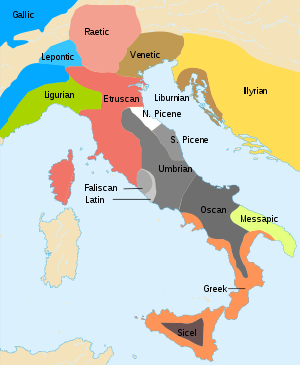- Oscan language
-
Oscan 
Denarius of Marsican Confederation with Oscan legendSpoken in Samnium, Campania, Lucania, Calabria and Abruzzo Region south and south-central Italy Extinct Latest inscriptions 1st century BC Language family Indo-European- Italic
- Osco-Umbrian (Sabellic)
- Oscan
- Osco-Umbrian (Sabellic)
Writing system Old Italic alphabet Language codes ISO 639-3 osc  Approximate distribution of languages in Iron Age Italy during the 6th century BC
Approximate distribution of languages in Iron Age Italy during the 6th century BCThis page contains IPA phonetic symbols in Unicode. Without proper rendering support, you may see question marks, boxes, or other symbols instead of Unicode characters. Oscan is a term used to describe both an extinct language of southern Italy and the language group to which it belonged.
The Oscan language was spoken by a number of tribes, including the Samnites[1], the Aurunci, the Sidicini, and the Ausones. The latter three tribes were often grouped under the name "Osci". The Oscan group is part of the Osco-Umbrian or Sabellic family, and includes the Oscan language and three variants (Hernican, Marrucinian and Paelignian) known only from inscriptions left by the Hernici, Marrucini and Paeligni, minor tribes of eastern central Italy. The language was spoken from approximately 500 BCE to 100 CE[2].
Contents
Evidence
Oscan is known from inscriptions dating as far back as the 5th century BCE. The most important Oscan inscriptions are the Tabula Bantina and the Cippus Abellanus.
General characteristics
Oscan had much in common with Latin, though there are also many striking differences, and many common word-groups in Latin were absent or represented by entirely different forms. For example, Latin volo, velle, volui, and other such forms from the Proto-Indo-European root *wel ('to will') were represented by words derived from *gher ('to desire'): Oscan herest ('he shall want, he shall desire', English cognate 'yearn') as opposed to Latin vult (id.). Latin locus (place) was absent and represented by the hapax slaagid (place), which Italian linguist Alberto Manco has recently referred to a local surviving toponym.[3]
In phonology, Oscan also showed differences from Latin: Oscan 'p' in place of Latin 'qu' (Osc. pis, Lat. quis) (similar to the P-Celtic/Q-Celtic change in the Celtic languages); 'b' in place of Latin 'v'; medial 'f' in contrast to Latin 'b' or 'd' (Osc. mefiai, Lat. mediae).[citation needed].
Oscan is considered the most conservative of all the known Italic languages, and among attested Indo-European languages it is rivaled only by Greek in the retention of the inherited vowel system with the diphthongs intact.
Writing system
Oscan was written in the Latin and Greek alphabets, as well as in a variety of the Old Italic alphabet.
The native Oscan alphabet and a transliteration are as follows.
Wikimedia Foundation. 2010.
Look at other dictionaries:
Oscan language — Italic language formerly spoken in southern and central Italy, related closely to Umbrian and more distantly to Latin. It was probably the native tongue of the Samnite people of Italy s central mountainous region. Oscan was gradually displaced by … Universalium
Oscan — 1. adjective Of or pertaining to the Oscan language or Oscan people, or their writing system. 2. noun a) A member of an ancient group of Italic speaking peoples of Campania (the Osci). b) The language of the Oscan people … Wiktionary
language — /lang gwij/, n. 1. a body of words and the systems for their use common to a people who are of the same community or nation, the same geographical area, or the same cultural tradition: the two languages of Belgium; a Bantu language; the French… … Universalium
Oscan — [äs′kən] n. [< L Oscus, Oscan + AN] 1. a member of an ancient people that lived in Campania, in S Italy 2. the Italic language of this people adj. of the Oscans or their language or culture … English World dictionary
Oscan — Os can, a. Of or pertaining to the Osci, a primitive people of Campania, a province of ancient Italy. n. The language of the Osci. [1913 Webster] … The Collaborative International Dictionary of English
Oscan — [ ɒsk(ə)n] noun an extinct Italic language of southern Italy, related to Umbrian and surviving in inscriptions mainly of the 4th to 1st centuries BC. adjective relating to Oscan. Origin C16: from L. Oscus Oscan + an … English new terms dictionary
Oscan — Os•can [[t]ˈɒs kən[/t]] n. 1) peo an Italic language spoken in much of central and S Italy: gradually supplanted by Latin after the absorption of the area by Rome in the 3rd century b.c. 2) peo a member of any of the Oscan speaking peoples of… … From formal English to slang
Language family — See also: List of language families A language family is a group of languages related through descent from a common ancestor, called the proto language of that family. The term family comes from the tree model of language origination in… … Wikipedia
language — I (New American Roget s College Thesaurus) System of communication Nouns 1. language, tongue, lingo, vernacular, mother tongue, protolanguage; living or dead language; idiom, parlance, phraseology; wording; dialect, patois, cant, jargon, lingo,… … English dictionary for students
Oscan — noun Etymology: Latin Oscus Date: 1753 1. a member of a people of ancient Italy occupying Campania 2. the language of the Oscan people see Indo European languages table … New Collegiate Dictionary
- Italic
